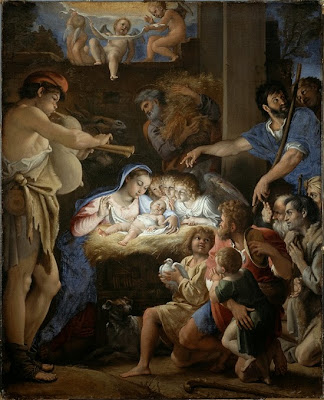 |
| Adoration of the Shepherds - Domenichino |
TODAY'S SPECIAL: Luke 2:15-21
TO CHEW ON: "Then the shepherds returned, glorifying and praising God for all the things they had heard and seen as it was told them." Luke 2:20
How wonderful that the birth of Jesus the Good Shepherd was announced first to shepherds!
These were no ordinary shepherds, though. "They were shepherds appointed to care for the temple flocks, destined for sacrifices. These flocks stayed in the fields throughout the year, even during winter" - Victor Handbook of Bible Knowledge, p. 325.
Thirty-three years from that time, the death of the One (the Lamb of God) they heard about on this night would make their job no longer necessary.
Though throughout Israel's history being a shepherd was considered a respectable calling, during Jesus' time they were thought to be a wild lot.* Their behavior on this night would probably have reinforced that conclusion as this joyful, rowdy crowd exclaimed and sang and praised God through the sleeping Bethlehem streets on their way back to the Judean hills. They had found the baby Jesus, just as the angel had told them!
I ask myself, have I been with Jesus this year? Have you? Where have we seen His hand on our lives? Felt His presence? Knelt and worshiped before His glory?
As we approach the end of the year, let's recall our encounters with Him. Let's realize He is with us here, right now, even as we read and think and pray. Then let's leave 2013 like the shepherds left Bethlehem that night: "… glorifying and praising God for all the things they had heard and seen…"
PRAYER: Dear Jesus, thank You for meetings with You that fill me with unexplainable joy, praise and a desire to worship. May our past history together fill me with hope and expectation as I step into a new year. Amen.
* Illustrated Manners and Customs of the Bible, edited by J.I. Packer & M.C. Tenney, p. 228
***********
New King James Version (NKJV) Used with permission. The Holy Bible, New King James Version Copyright © 1982 by Thomas Nelson, Inc.


















